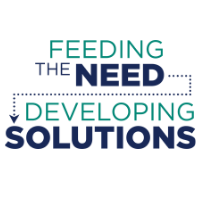WEBINAR SERIES

The MacDonald Center for Nutrition Education and Research (MCNER)
2024 Feeding the Need Webinar Series
Type 2 diabetes (T2D) is a leading cause of and contributor to death in the U.S., disproportionately impacting historically underserved populations and it is well known that food insecurity increases the risk of developing diabetes and its complications. Increasingly, practitioners are screening for social determinants of health, including food insecurity in healthcare settings, however, they are not always aware of the interventions and strategies available to address both food insecurity and diabetes. While the relationship between food insecurity and diabetes is complex, there are several promising policies and programs that can support both food security and health. Join us to learn about the mechanisms that underlie the association between food insecurity and diabetes, along with the research, policy, and practice opportunities that exist to address food insecurity and reduce diabetes-related health disparities.
Earn 1 free contact hour (RN) or 1 CPEU (RD/RDN/DTR)
Upon completing this activity, the learner will be able to:
- Identify and understand a rationale and strategy for screening for food insecurity in the clinical setting.
- Describe the range of interventions and policies that exist for addressing food insecurity and diabetes.

Ronli Levi, MPH, RD
Ronli Levi, MPH, RD, is Director of Research and Evaluation at the Seligman Lab of the University of California’s Center for Vulnerable Populations, where she manages a number of food and nutrition security-based interventions and programs, including an evaluation of the impact of federal assistance programs on diabetes-related outcomes and a Feeding America Food as Medicine grant, providing programmatic and evaluation support for 21 food bank-health care partnerships. She coordinated the Healthy Eating Research Food Bank Nutrition Standards Expert Panel and led the writing and development of this guidance which has been widely diseminated and adopted by food banks to provide nutritious options. Ronli is author or co-author on numerous journal articles focusing on nutritional standards for charitable food systems, food insecurity and diabetes, and assessing and monitoring nutrition security to promote improved outcomes and reach, engagement and effectiveness in diabetes prevention.
Visit villanova.edu/COPE or email mcner@villanova.edu to join our Contact list or for more information on how to become a Webinar Sponsor. A non-profit center, MCNER is based in the Fitzpatrick College of Nursing at Villanova University. MCNER supports and develops educational programs for health professionals, educators, work sites and the public.
**Please note our Center (formally known as COPE) is changing names to the MacDonald Center for Nutrition Education and Research (MCNER). Please be patient as we make this transition as you may see us use both names interchangeably.
Details on CE Credits
There are no relevant financial relationships with ineligible companies for those involved with the ability to control the content of the activity.
To receive a CE certificate, you must individually register online for the webinar and attend the full program. All nurses must complete an online evaluation.
Villanova University M. Louise Fitzpatrick College of Nursing is accredited as a provider of nursing continuing professional development by the American Nurses Credentialing Center’s Commission on Accreditation.
Villanova University Fitzpatrick College of Nursing MacDonald Center for Nutrition Education and Research provides Continuing Professional Education in accordance with the Prior Approval Program of the Commission on Dietetic Registration.
CDR Credentialed Practitioners will receive 1 Continuing Professional Education Unit (CPEU) for completion of this activity.
Dietary therapies are increasingly common in the management of disorders of gut brain interaction (DGBI) including irritable bowel syndrome, functional dyspepsia, and other conditions. While there is growing evidence of the role of diet in altering gastrointestinal (GI) symptoms, the microbiome and quality of life, there are also psychological considerations around who is appropriate for dietary restriction. Dr. Keefer will focus on practical approaches for evaluating a patient’s appropriateness for a dietary intervention, considering the nutritional, psychological, behavioral, and social context in which a patient may find themselves managing their DGBI with dietary intervention. She will also discuss how to identify risk factors for and symptoms of avoidant/restrictive food intake disorder, a growing concern in the DGBI population.
Upon completing this activity, the learner will be able to:
- Understand the Biopsychosocial Model of DGBI, with an emphasis on psychosocial factors impacting symptom perception and self-management behavior.
- Gain a deeper knowledge and comfort with psychological implications of nutrition therapies for DGBI.
- Learn how to assess for Avoidant Restrictive Food Intake Disorder (ARFID).

Dr. Laurie Keefer, PhD
Dr. Laurie Keefer, PhD is a GI Health Psychologist and Professor of Medicine and Psychiatry at the Icahn School of Medicine at Mount Sinai in New York City. She has a more than 20 years of experience in the development and implementation of behavioral therapies for chronic digestive disorders, including Inflammatory Bowel Disease (IBD). She currently directs the GRITT Program, an integrated care model for Crohn’s and ulcerative colitis patients within the IBD Center at Mount Sinai Hospital and maintains a clinical practice focused on psychosocial concerns among medically complex IBD. Dr. Keefer received her PhD in clinical psychology from the University of Albany in New York and completed a residency and fellowship in health psychology at Rush University Medical Center in Chicago. Dr. Keefer’s research focuses on the application of positive psychology principles, particularly resilience and acceptance in the management of chronic digestive problems and has more than 200 peer-reviewed publications and is a sought-after speaker, mentor and collaborator.
Details on CE Credits
To receive a CE certificate, you must individually register online for the webinar and attend the full program.
This activity has been approved by CDR for 1 CPEU.
Visit villanova.edu/COPE or email mcner@villanova.edu to join our Contact list or for more information on how to become a Webinar Sponsor. A non-profit center, MCNER is based in the Fitzpatrick College of Nursing at Villanova University. MCNER supports and develops educational programs for health professionals, educators, work sites and the public.
Interested in learning more about the latest digital technologies for diet and health self-monitoring? Research shows that improving diet can potentially prevent up to one in five deaths globally, however, an essential step to improving diet is to monitor food intake and eating behaviors, and conventional methods are known to be burdensome and error prone. Over the past decade, several technological innovations have been proposed to facilitate food logging to improve self-management and assist with lifestyle and behavioral changes, and these digital technologies continue to evolve. This presentation provides an overview of such innovations in three key areas: mobile applications for diet logging, wearable sensors to detect dietary behaviors, and personalized nutrition programs using machine learning (ML) techniques. The talk will also present results from an ongoing study that seeks to demonstrate the effectiveness of models that can predict macronutrient intake by analyzing post-prandial concentrations of glucose and other nutritional biomarkers using in-dwelling and implantable sensors. The webinar concludes with a discussion of potential pitfalls of relying excessively on technology to monitor one’s diet and health.

Ricardo Gutierrez-Osuna, PhD
Ricardo Gutierrez-Osuna received a B.S. in Electrical Engineering from the Polytechnic University of Madrid (Spain) in 1992, and MS and PhD degrees in Computer Engineering from North Carolina State University in 1995 and 1998, respectively. Currently, he is a Professor of Computer Science and Engineering at Texas A&M University, where he conducts research at the interface between machine learning, sensor informatics, and digital health. His work has been funded by the National Science Foundation and the National Institutes of Health. He learned to use an air fryer in 2018 and an instant pot in 2023 and has never looked back
Upon completing this activity, the learner will be able to:
- Review the benefits and limitations of digital technologies in promoting sustained diet and behavioral changes.
- Provide an overview of technological innovations to facilitate dietary monitoring, including mobile applications, wearable sensors, and personalized nutrition programs.
- Discuss emerging research and potential health implications of digital innovations that predict macronutrient intake through machine learning modeling of post prandial glucose and other nutritional biomarkers.
Details on CE Credits
To receive a CE certificate, you must individually register online for the webinar and attend the full program.
This Continuing Professional Education (CPE) is pending approval for 1 CPEU in accordance with the Commission on Dietetic Registration’s CPEU Prior Approval Program.
Visit villanova.edu/COPE or email mcner@villanova.edu to join our Contact list or for more information on how to become a Webinar Sponsor. A non-profit center, MCNER is based in the Fitzpatrick College of Nursing at Villanova University. MCNER supports and develops educational programs for health professionals, educators, work sites and the public.
According to the Centers for Disease Control and Prevention, food allergies are a growing food safety and public health concern affecting about 8% of children in the United States, or about 1 in 13 children. Children experiencing food allergies and their families face social, emotional and medical challenges. Food allergy prevention is a strategy that can significantly improve quality of life and nutritional well-being. Understanding the progression of food allergies and the “allergic march” sequence will aid in gaining confidence with decision making for early introduction of the FDA recognized highly allergenic foods. These introductions will also improve feeding skills as they vary in texture, temperature, color and taste. This webinar will explore the latest evidence-based guidelines and educational strategies on preventing and managing food allergies.

Raquel Durban, MS, RD, LD/N
Raquel Durban, MS, RD, LD/N, a registered dietitian at the Carolina Asthma and Allergy Center, specializes in dietary management for families with food allergies. She received her MS degree in nutrition from the University of Maryland and completed an internship at the University of North Carolina at Greensboro. Raquel is a sought-after speaker at allergy and immunology conferences and has contributed to peer reviewed publications and continuing education programs. She co-chairs the internship program of the International Network of Dietitians and Nutritionists in Allergy and serves on the Medical Advisory Board of the International Association for Food Protein Enterocolitis. Raquel serves in many capacities with the American Academy of Allergy, Asthma, and Immunology (AAAAI) and the American College of Allergy, Asthma, and Immunology (ACAAI), collaborating with other health care professionals and patient advocacy groups to improve quality of life and advance understanding for families living with the challenges of food allergies.
Upon completing this activity, the learner will be able to:
- Identify the patient population most at risk for food allergy development.
- Discuss current food allergy testing methods.
- Provide an overview on current prevention and management strategies, including factors to consider in safely introducing highly allergenic foods.
Details on CE Credits
Earn 1 free contact hour (RN) or 1 CPEU (RD/RDN/DTR).
There are no relevant financial relationships with ineligible companies for those involved with the ability to control the content of the activity.
To receive a CE certificate, you must individually register online for the webinar and attend the full program. All nurses must complete an online evaluation.
Villanova University M. Louise Fitzpatrick College of Nursing is accredited as a provider of nursing continuing professional development by the American Nurses Credentialing Center’s Commission on Accreditation.
This activity has been prior approved by the Commission on Dietetic Registration for 1 CPEU.
Visit villanova.edu/COPE or email mcner@villanova.edu to join our Contact list or for more information on how to become a Webinar Sponsor. A non-profit center, MCNER is based in the Fitzpatrick College of Nursing at Villanova University. MCNER supports and develops educational programs for health professionals, educators, work sites and the public.
Can what you eat impact how you breathe, even if you are healthy? According to the American Lung Association, more than 34 million Americans live with lung disease. When combined with lung cancer and respiratory diseases like COVID-19 and influenza, lung disease is among the top causes of death by disease in America. For this reason, maintaining optimal lung function is a major public health concern. Diet may play a role in lung health, along with other preventative measures, but the research is still evolving. This session will explore the emerging role nutrition plays in maintaining lung health over the course of a lifespan and will explore the research and evidence linking nutrition and lung health

Corrine Hanson, PhD, RDN, LMNT
Corrine Hanson, PhD, RDN, LMNT is Professor of Nutrition and Director of the Medical Nutrition program at University of Nebraska Medical Center. She earned a Master’s of Human Nutrition, and PhD from the University of Nebraska Medical Center. Dr. Hanson is a Fellow of the Academy of Nutrition and Dietetics and was named a UNMC Distinguished Scientist in 2019. A registered dietitian by training, Dr. Hanson has extensive clinical experience that informs her teaching and research interests. Her career has been dedicated to understanding the effects of nutrition on the promotion of health and the development and progression of disease. She is Principal or Co-Investigator on many regional, state and federally-funded grant projects and is the author or co-author on over 200 journal articles focusing on how nutrition affects health and disease at different points in the lifecycle and in different sub-populations
Upon completing this activity, the learner will be able to:
- Provide an overview of the research on nutrition and lung health.
- Develop an understanding of the role nutrition plays in lung health prior to the development of lung disease.
- Identify practical applications for improvements in lung health.
Details on CE Credits
There are no relevant financial relationships with ineligible companies for those involved with the ability to control the content of the activity.
To receive a CE certificate, you must individually register online for the webinar and attend the full program. All nurses must complete an online evaluation.
Villanova University M. Louise Fitzpatrick College of Nursing is accredited as a provider of nursing continuing professional development by the American Nurses Credentialing Center’s Commission on Accreditation. This activity awards 1 contact hour for nursing professionals.
This activity is pending approval by CDR for 1 CPEU.
Visit villanova.edu/COPE or email mcner@villanova.edu to join our Contact list or for more information on how to become a Webinar Sponsor. A non-profit center, MCNER is based in the Fitzpatrick College of Nursing at Villanova University. MCNER supports and develops educational programs for health professionals, educators, work sites and the public.
To view past webinar and program recordings, check out our Material Archives page.

